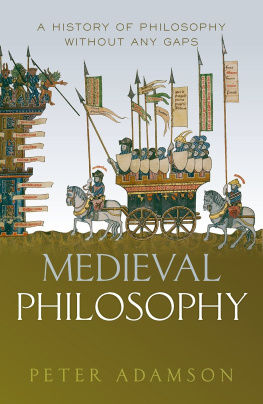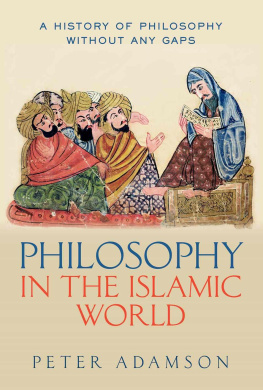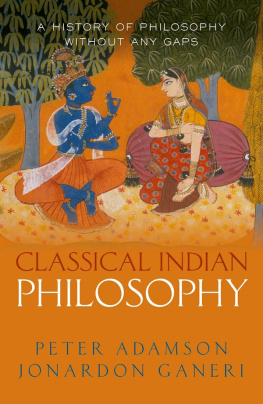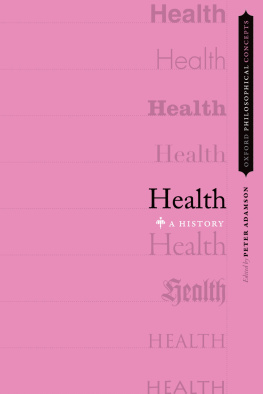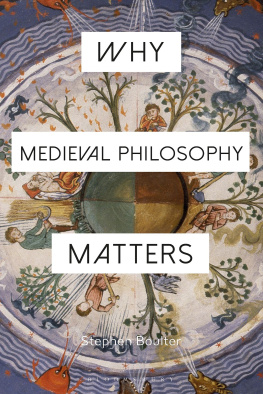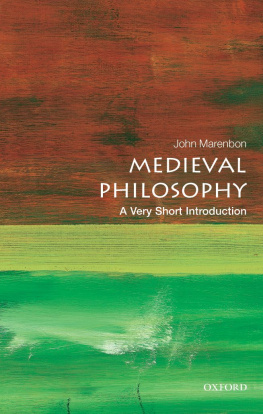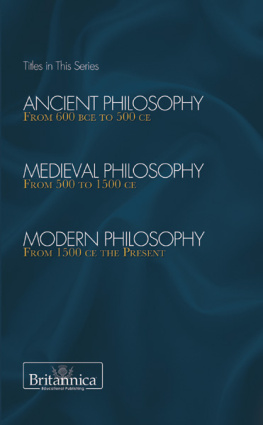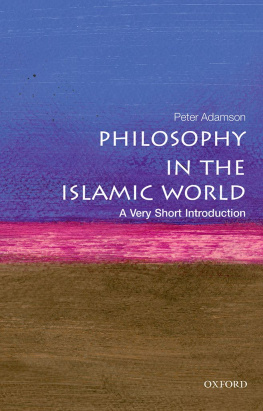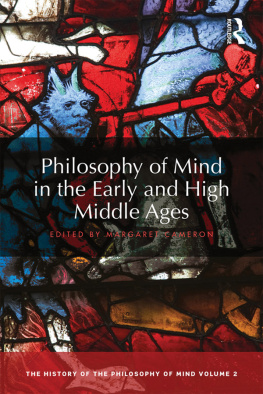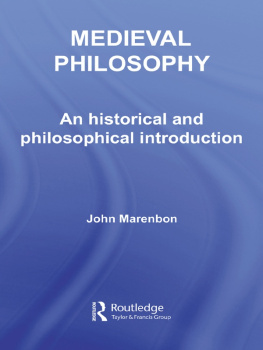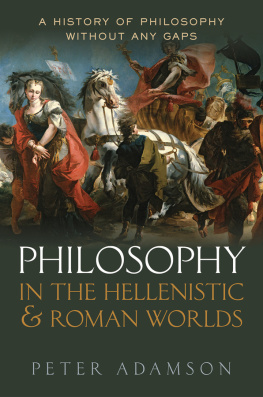Medieval Philosophy
Peter Adamson
Medieval Philosophy
a history of philosophy without any gaps volume 4
Great Clarendon Street, Oxford, ox 2 6 dp , United Kingdom
Oxford University Press is a department of the University of Oxford. It furthers the University's objective of excellence in research, scholarship, and education by publishing worldwide. Oxford is a registered trade mark of Oxford University Press in the UK and in certain other countries
Peter Adamson 2019
The moral rights of the author have been asserted
First Edition published in 2019
Impression: 1
All rights reserved. No part of this publication may be reproduced, stored in a retrieval system, or transmitted, in any form or by any means, without the prior permission in writing of Oxford University Press, or as expressly permitted by law, by licence or under terms agreed with the appropriate reprographics rights organization. Enquiries concerning reproduction outside the scope of the above should be sent to the Rights Department, Oxford University Press, at the address above
You must not circulate this work in any other form and you must impose this same condition on any acquirer
Published in the United States of America by Oxford University Press
198 Madison Avenue, New York, NY 10016, United States of America
British Library Cataloguing in Publication Data
Data available
Library of Congress Control Number: 2019947222
ISBN9780198842408
ebook ISBN9780192579942
Printed and bound in Great Britain by Clays Ltd, Elcograf S.p.A.
Links to third party websites are provided by Oxford in good faith and for information only. Oxford disclaims any responsibility for the materials contained in any third party website referenced in this work.
For my father, David Adamson
CONTENTS
There is, as it turns out, quite a lot of medieval philosophy. Its a huge territory to explore, even if you are not dealing with philosophy in the Islamic world or Byzantium (respectively covered in the previous and next installments of this book series). Just compare this book to earlier offerings in the series: Classical Philosophy included a mere forty-three chapters and Philosophy in the Hellenistic and Roman Worlds fifty-three chapters. Thats fewer than a hundred chapters to cover about a millennium of philosophy in total, whereas in this volume telling the story of medieval thought will take seventy-eight chapters for only half a millennium, from the ninth to the fourteenth centuries. And this despite the fact that there isnt much to say about the tenth and eleventh centuries, the so called Dark Ageseven if there is somewhat more to say than you might think. The profusion of material may come as a surprise, given that most non-specialists would be hard pressed to name more than a handful of medieval philosophers.
But it makes historical sense. As we get closer to the present, there is simply more in the way of surviving text; from the medieval age we even have manuscripts in the original handwriting of some of the main protagonists. Furthermore, this period saw the rise of institutions that produced a staggering amount of philosophical writing, especially for use in classroom contexts. Consider that a document providing information on the members of the University of Paris just in the year 132930 records about two thousand individuals. And these are people whose names we know! The number of extant works by unidentified authors is so large that you could produce a creditable history of medieval scholasticism by discussing nothing but anonymous manuscripts (a history of philosophy without any names, if you will). To make matters yet more daunting, in this book we are frequently going to go beyond the world of the schoolmen. We will be discussing the philosophical contributions of men who were not masters at the schools and universities, and of thinkers who werent men at all. Indeed one of the most exciting features of medieval thought, one particularly highlighted in this book, is the survival of numerous works by women. This makes for another contrast with the ancient world, whose women philosophers speak to us only through the intermediary of male authors.
In below I set out the chronological range of medieval philosophy and begin to make a case for the broad approach I have taken to the subject, which includes topics like mysticism and natural science. So there is no need to do that here. Instead I would just like to give some brief advice about how to read the book. Ideally, you should start at the beginning and go through to the end without skipping anything (this is after all how I wrote it). Hopefully that will give you an impression of the different epochs of medieval philosophy and its evolution from one period to the next. It may be, though, that you are more interested in some philosophical topics than others, in which case you may be frustrated by the chronological rather than thematic arrangement of the material. Here, then, are a few thematic threads that could be followed through the book by reading it with gaps.
We may as well start with God. Its worth emphasizing already now that, contrary to popular belief, medieval philosophy is about much more than just theology. Many of the chapters that follow have nothing to say about religion at all. But if you are primarily coming to this material with an interest in the philosophy of religion, you might want to focus on those chapters dealing with proofs of Gods existence and manner of being (Chapters ).
If youre interested in everything Ive just mentioned, go straight to Henry of Ghent (), because he was too.
If your interest in matters psychological runs more towards knowledge and the mind, then you may want to look at the epistemological debate between upholders of representationalism and knowledge as direct relation (Chapters ).
A medieval scholastic would at this point complain that you are going about things in the wrong order. You should really start with logic and the philosophy of language (Chapters ).
Once youve studied logic, youre ready for the mathematical disciplines of the quadrivium and for natural philosophy, which became increasingly mathematical in its approach as the Middle Ages developed (Chapters .
Whether you read the book selectively or straight through, I would consider my mission as an author accomplished if it leaves you unsatisfied. My fondest hope is that youll be struck, even if only occasionally, by the thought that medieval philosophers had some extraordinarily interesting ideas and that you would like to follow up on what youve read here by turning to the original sources. Happily, almost all the figures covered here are at least partially available in English translation. The notes to the chapters will give you references to many such translations. For anthologies of primary texts and for secondary literature, you can start by consulting the Further Reading section at the back of the book. Finally, I would point you towards the History of Philosophy podcast series. It included not only most of the material that became the basis of this book, but also numerous interviews with experts on a wide range of topics in medieval thought, all of it free to listen via that modern equivalent of the Averroist collective mind we call the Internet, at www.historyofphilosophy.net.
One of the most gratifying things about working on this book series has been the extraordinary generosity of colleagues around the world who have shared their expertise with me. From early on I was given valuable advice about what to cover in the book and on drafts of individual chapters; also, many of these scholars agreed to be interviewed for the podcast version. I would here like to record my gratitude to the academic experts who appeared as guests on the series: Andrew Arlig, Rachel Barney, Susan Brower-Toland, Charles Burnett, Therese Cory, Richard Cross, Isabel Davis, Catarina Dutilh Novaes, Kent Emery, Russ Friedman, Stephen Gersh, Monica Green, Caroline Humfress, Mark Kalderon, Peter King, Jill Kraye, Scott MacDonald, John Marenbon, Robert Pasnau, Dominik Perler, Martin Pickav, Giorgio Pini, Tom Pink, Christof Rapp, Andreas Speer, Eileen Sweeney, Juhana Toivanen, Sara Uckelman, and Jack Zupko, as well as fellow podcasters Sharyn Eastaugh, Jamie Jeffers, and Robin Pearson. Pretty well all of them also gave me advice that was helpful in writing the book. I am particularly grateful to Catarina Dutilh Novaes, Danielle Layne, Dominik Perler, and Giorgio Pini for general discussion of how to approach the medieval period, and to Martin Pickav and Christina Van Dyke for invaluable comments on the entire manuscript, and for further discussion. Further advice on particular topics is acknowledged in the notes to the relevant chapters. Any mistakes or infelicities that remain are, of course, to be blamed not on these many helpful scholars but on Gods providential plan for the universe.

